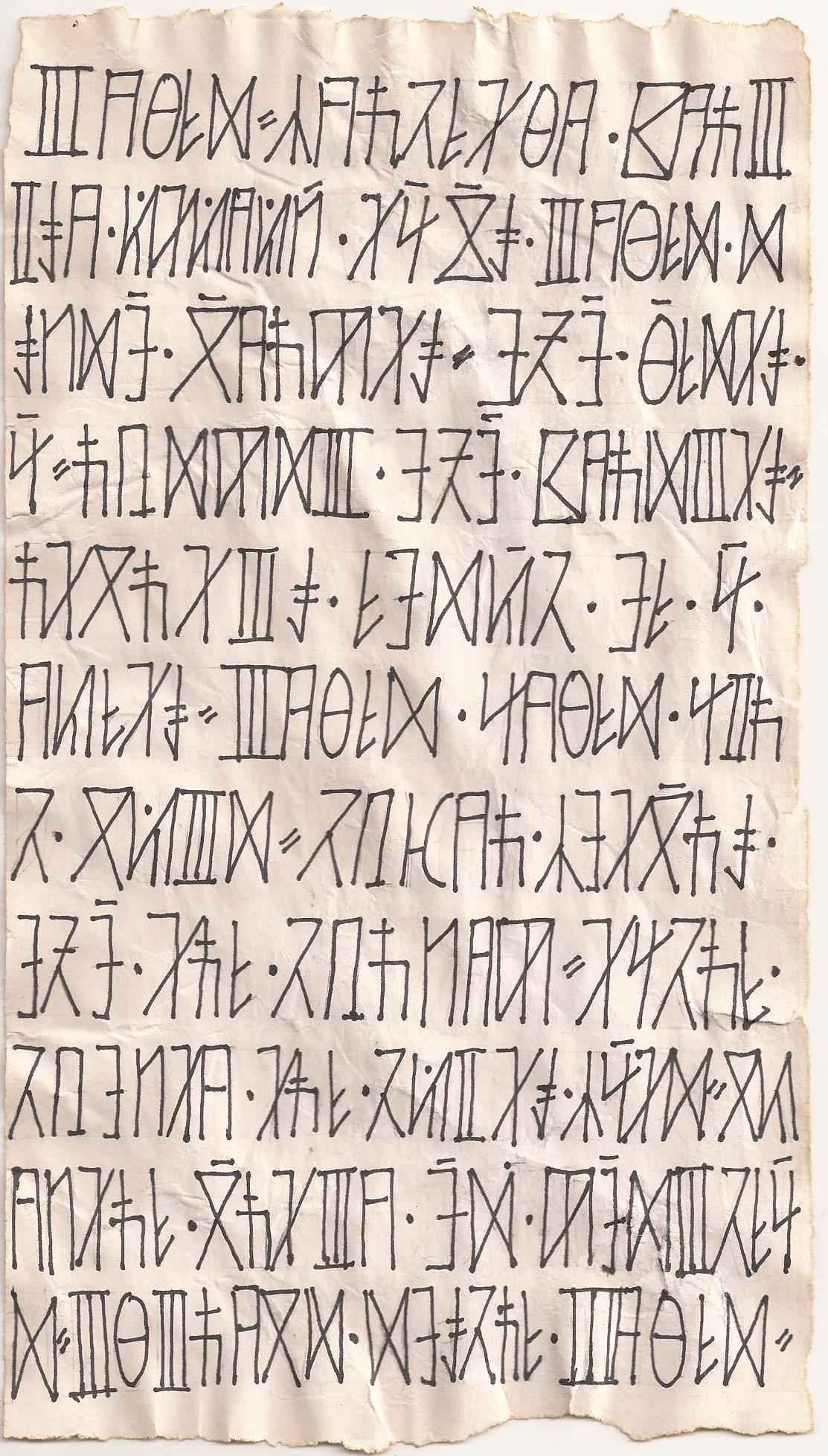Original Document

Untitled document, later named Drohtynvether ("The Warrior's Honor")
c. 1512, kroav ink on vellum
Transcription/Translation
Original Transcription:
[transcription in yeti language shall be here once I decide how I'm gonna get it on here]
drohytyn
hrastor bardagthyr Elireck Lizheth
drohtyn nethkenne framleth eshe utanleth
aye oppenmund esha brandleth
Allvaldeth tenysh et aye rettleth
Drohtyn aroten aigas vidyn
Spura hellath eshe lot spakrym
laisot speklor lot sygleth heilan
vyrklot faldr wen mundstein
dodar-vin nethsat drohtyn.
Transcription/Translation (Common Language)
Transcription in Common Language*:
Brothers,Undaunted we battle Elirek's Tricksterᶧ.
Our brotherhood knows no frontier.
We keep our hearts facing ever outward,
keeping an outreached hand and welcoming hearth.
One's tongue is sovereign only as long as it is just;
We seek and deliver only truth.
Only a wise man sees the full map;
We gather a vast body of knowledge to stay on true course.
We grip the earth with stone hands;
Our brotherhood cannot be moved even by the Dodar winds.
*as closely as inevitable hysteresis in translation will allow
ᶧ an allusion to a drama written by classic playwright Elirek
History and Cultural Context
Historical Background:The early 1500's (c.1509-1524) were very unstable and difficult times for mainland Yeti settlements. Although the coastline of what would become Titania (not yet founded) was by this time populated by several strongly established citadels, they were not yet united. Political power came to those who took the most land and controlled the most resources.
Hjem, due to its well-established ports, was the most powerful citadel, ruled by King Alef, a young man who would later be one of the major contributors to the end of this period of war. Because of the constant threat looming over his farmlands, often had his soldiers patrolling all parts of the city. Many of these soldiers had fought alongside Alef when the city was taken, and were responsible for much of the dereliction of the citadel. Their constant presence made merchants and farmers uneasy and even rebellious.
In an effort to quell the resentment and nervousness of those who lived within his walls, Alef constructed a strict code of conduct for his warriors. The code documents five behavioral pillars that every member of the drohtynbror* was required to uphold:
Valor (Hiraustor)
– bravery in the face of battle; undaunted by fear; Steady and thoughtful
strategy (the wisdom to know when to fight and when to wait); overcoming
emotional fault
Knowledge/Truth (speklor/organdor) – there is power in having a
diverse knowledge both scholarly and practical; wisdom to solve problems
complexly; ingenuity; Seeing the whole map rather than just a piece; Pursuit of
the truth must be held over pursuit of justice.
Altruism (Shtor) –
holding the greater good above selfish wants and needs; setting aside one’s own
conflicts to solve the conflicts of the community; Hospitality
Democracy (Arenlor)
– “Round Table” paradigm; many perspectives are needed to create a complete
map; conflicts and judgments must be dealt with by discussion and majority
agreement; power is checked by people;
Mercy (Mysklor) –
battle is necessary, but fleeting; humankind must ultimately show mercy and
kindness toward one another in order for things to be built and grow stronger;
medical treatment of enemy soldiers; Strength in rejecting petty grudges and
bloodshed
The document consisted of several parts: A formal decree from the King which enforced the code, the oath (the recently recovered part of the document) which was written in verse -- customary of the time, to facilitate the reciting and internalizing these rules – as well as a contract portion, signed by each soldier.
This document was lost in subsequent wars, however, the oath remained even after the kingdoms became united, as a code of conduct for the militia as a way to both enforce a sence of moral duty and humility in soldiers as well as to generate popularity of the military among civilians. It also became a popular motif in poetry and literature in the 1600’s, when a poet named the oath Drohtynvethr (“A Warrior’s Honor”). The name has been associated with the document since.
Modern times no longer have need of the Drohytnvethr though many of the behaviors are still practiced among the military as well as by government offices. However, it has been adopted by many grammar schools and military academies to instill morality and important qualities in children/young adults.
